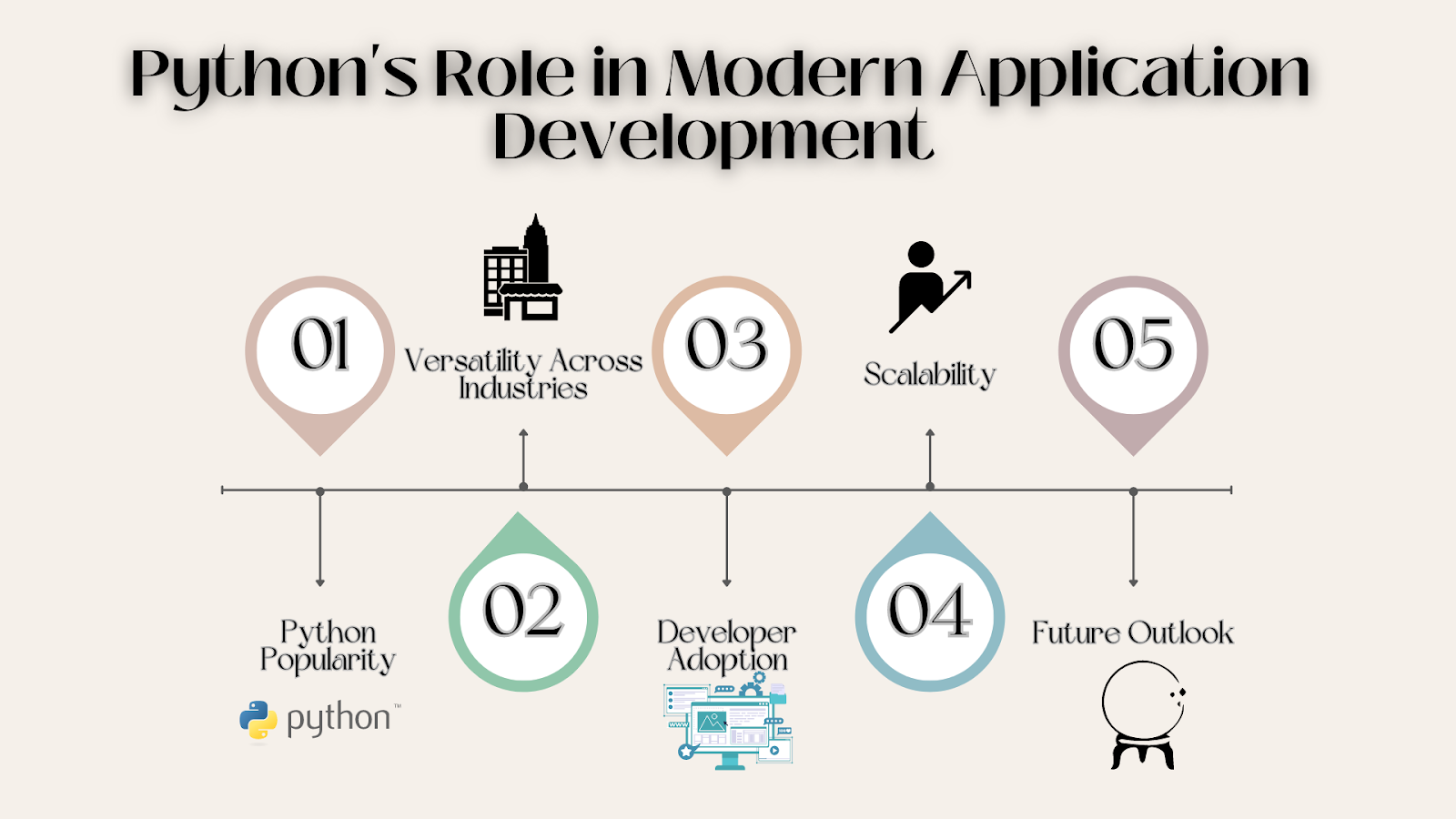
Maintaining a competitive edge in today's fast-paced digital market requires seamless integration of business procedures. Let's talk about the unsung heroes of contemporary application development: Python APIs. But why are they so crucial, and how might they completely transform the way your business operates? Now, let's get started.
Introduction: Python's Dominance in Modern Application Development
Python's flexibility is crucial as firms increasingly prioritise innovation and agility. Python's seamless integration into various technical environments, from web development and data science to automation and artificial intelligence, drives advances in software development. Python's popularity highlights its importance for the future of application development, where performance and adaptability are critical.
What are APIs, and Why Do They Matter?
In the realm of business integration, APIs are the magic element because they enable seamless connectivity. APIs, or application programming interfaces, are fundamental components of contemporary software integration. They act as links that facilitate effective communication and data sharing among various systems.

Source: Statista
Additionally, the widespread use of Python in developing these APIs creates a high demand for Python programming jobs that will train you in integrating business systems efficiently:
- Seamless data exchange between disparate systems
- Automation of complex business processes
- Enhanced customer experiences through integrated services
Key Benefits of Python APIs in Business Integration
Python APIs are the business applications' turbochargers, providing scalability and rapid development while allowing businesses to react swiftly to changing customer demands. Businesses that use APIs see a quicker time to market for their new goods and services.
Python's biggest asset is its adaptability; its APIs can be tailored to suit different system architectures and business needs, which makes them perfect for a wide range of sectors and business sizes. Python APIs provide significant cost benefits by simplifying development processes and lowering integration difficulty, which directly affects the bottom line and enables groups to spend resources more wisely.
Investor and Entrepreneur Spotlight: The ROI of Python APIs
Adopting Python APIs can be transformative for investors, entrepreneurs, and founders for several reasons. Python's ease of use enables quick prototyping, helping business owners quickly introduce their Minimum Viable Product (MVP). Python APIs provide smooth scalability to cope with growing demand without needing major redesigns as businesses expand.
Python's widespread application also makes it easier to find talent since experienced engineers who know the language are easier to find, which lowers recruiting expenses and shortens the time it takes to begin working.
In addition, by showcasing their technological agility and efficiency, firms using Python APIs might attract investors looking for scalable and innovative ventures.
Moreover, Python's adaptability can be leveraged to enhance sales intelligence, providing businesses with deeper insights and data-driven strategies, such as those available from a SERP API, which offers real-time search engine result page data that can inform SEO strategies and competitive analysis.
Technical Insights: Crafting Robust Python APIs
Python provides reliable frameworks built specifically for API development: Flask, which is best known for being lightweight and versatile, works well for smaller projects, but Django, with its wide range of capabilities, is best suited for handling larger applications.
Consistency across endpoints, thorough and lucid documentation for seamless integration, and versioning methods that ensure backward compatibility and seamless improvements are all stressed by best practices in API design.
Comparison: Python vs. Other Languages for API Development
|
Feature
|
Python
|
Java
|
JavaScript (Node.js)
|
|
Learning Curve
|
Low
|
High
|
Medium
|
|
Development Speed
|
Fast
|
Moderate
|
Fast
|
|
Performance
|
Good
|
Excellent
|
Good
|
|
Community Support
|
Extensive
|
Extensive
|
Extensive
|
|
Scalability
|
Excellent
|
Excellent
|
Good
|
|
Ecosystem
|
Rich
|
Rich
|
Rich
|
Overcoming Challenges in Python API Integration
Compatibility problems are a common roadblock in API development that can be overcome effectively by using middleware for data transformation. Another frequent problem is performance bottlenecks, which can be lessened by using asynchronous processing methods and caching technologies.
To address these challenges, it's beneficial to hire Python developers who specialize in optimizing API performance.
The best ways to address security problems, which are critical in API contexts, are to ensure secure access to API endpoints, protect sensitive data from potential threats, and set up strong authentication mechanisms like OAuth.
The Future of Python APIs in Business Integration
As we look ahead, several trends are shaping the future of Python APIs:
- GraphQL: Offering more flexible and efficient data queries
- Asynchronous APIs: Enhancing performance for I/O-bound operations
- AI Integration: Leveraging machine learning models through APIs

FAQs
What is the importance of API in system integration?
Because they enable smooth communication between various software applications, APIs are essential for system integration. They give systems a uniform means of exchanging information and abilities, enabling the effective integration of many platforms.
What is the importance of APIs in business?
APIs are essential to modern businesses as they encourage efficiency and creativity. They let companies extend their offers, make use of outside resources, and generate new revenue streams. APIs facilitate partnerships, speed up product development, and enhance customer experiences through integrated services.
Why is Python good for application development?
Python's simplicity and versatility make it a great option for application development. Because of its vast library ecosystem and concise syntax, it accelerates development cycles, which makes it perfect for the MVP era and rapid prototyping.
Conclusion
Python APIs are a strategic advantage for businesses hoping to prosper in the digital era, not just a technical tool. Businesses can achieve new heights of efficiency, inventiveness, and competitive advantage through using them.